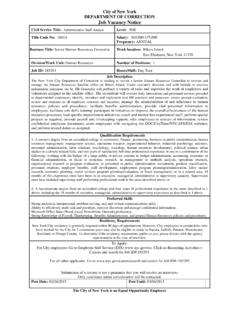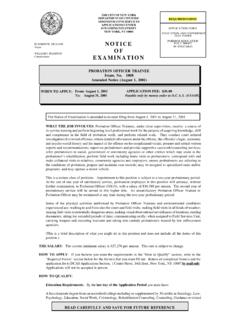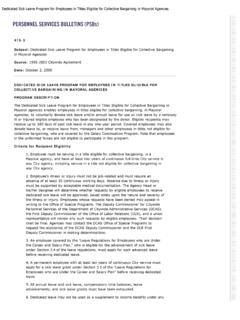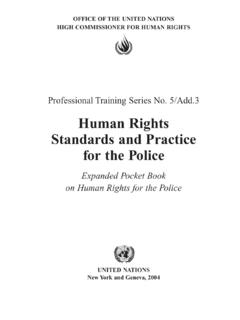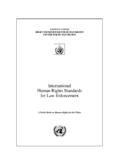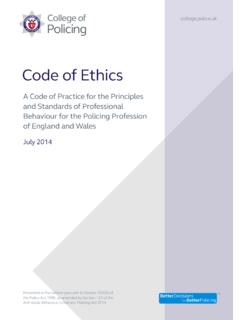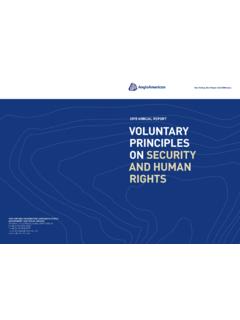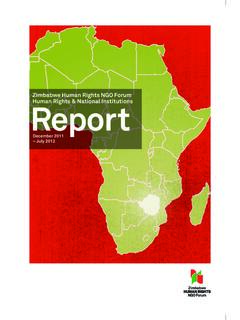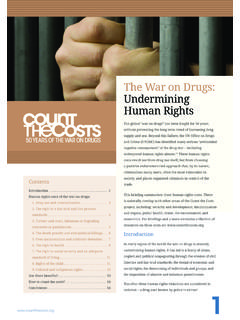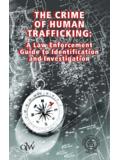Transcription of 100-13 - Welcome to NYC.gov | City of New York
1 100-13 Subject: Consideration of Criminal Convictions and Arrests in Hiring Supersedes: PSB 100-13 Consideration of Criminal Convictions in Hiring issued November 7, 2011 Source: Article 23-A, New York State Correction Law Section 296, New York Executive Law Section 8-107, New York City Administrative Code Date: August 31, 2016 Policy I. Background This Bulletin discusses local and state laws that prohibit discrimination in hiring decisions based on an applicant s record of arrests or criminal convictions. It explains when an agency may inquire about an applicant s conviction record; exceptions to the general rule; the standards an agency must apply when considering an applicant s prior criminal convictions in determining their suitability for employment; and the process to be followed when employment is denied. A. Article 23-A of the Correction Law: Record of Criminal Convictions Article 23-A of the New York Correction Law prohibits the denial of an application for employment because an applicant has been convicted of one or more criminal offenses unless (1) there is a direct relationship between the criminal offense and the employment sought or (2) the granting of employment involves an unreasonable risk to property or persons.
2 Membership in a law enforcement agency is not included in the definition of employment under Article 23-A. A violation of Article 23-A is also an unlawful discriminatory employment practice under the New York State Executive ( human rights ) Law and the New York City human rights Law. B. The State and City human rights Laws: Arrest Records It is an unlawful discriminatory practice for a City agency to deny employment to an individual, or act adversely upon or make any inquiry about the arrest of or criminal accusation against an individual which is not pending and which (1) was terminated in favor of the individual1; (2) resulted in a youthful offender adjudication; (3) resulted in a conviction for a violation; or (4) is sealed pursuant to the New York Criminal Procedure Law. However, those prohibitions do not apply to an application for employment as a police officer or peace officer and for employment or membership in any law enforcement agency.
3 1 In general, an arrest or charge is terminated in favor of the individual when the charges are dismissed, when the individual is acquitted, or when a conviction is vacated. A more complete description of the term terminated in favor of a person is set forth at Section (1)(e) of the New York Criminal Procedure Law. C. The Fair Chance Act: Pre-employment Inquiries Local Law 63 of 2015, also known as The Fair Chance Act, amended the City human rights Law. It sets forth additional requirements regarding inquiries into and consideration of an applicant s prior criminal convictions and pending arrests in the hiring process. Subject to exceptions described below, it prohibits an employer from making an inquiry or statement relating to a pending arrest or criminal conviction record of an applicant before the employer has made a conditional offer of Local Law 63 supersedes Executive Order No.
4 151 (Consideration of Criminal Convictions in Hiring), dated August 4, 2011, which had set forth policy and procedures regarding inquiry into and consideration of an applicant s prior criminal convictions in the hiring process. II. Applicability and Procedure A. Pre-employment Inquiries 1. General Rule: No Inquiries about Arrests or Convictions before a Conditional Offer of Employment An Agency may inquire into and consider an applicant s prior criminal convictions only after the agency has made a conditional offer of employment. In general, under The Fair Chance Act, agencies must not ask questions regarding an applicant s prior criminal convictions on any preliminary employment application, or ask questions about an applicant s prior criminal convictions before making an offer of employment to the applicant. After the agency has extended a conditional offer of employment, it may inquire about the applicant s arrest or conviction record.
5 However, before an agency withdraws a conditional offer of employment because of a criminal conviction, it must provide to the applicant a written copy of the analysis explaining why the withdrawal is permitted under Article 23-A. (See attachment: How to Comply with Article 23-A When Hiring ). 2. Exceptions to the General Rule: Law Enforcement and Investigation before Appointment Titles The Fair Chance Act permits agencies to inquire about records of criminal convictions before a conditional offer of employment has been made for certain positions. a. Law enforcement: An agency may inquire about a record of arrests or criminal convictions before a conditional offer of employment is made for positions of police officer and peace officer, including positions that require NYPD special patrolman status, or for a position at a law enforcement agency, including but not limited to the New York City Police Department, the New York City Fire Department, the New York City Department of Correction, the New York City Department of Investigation, the New York City Department of Probation, the Division of Youth and Family Services of the Administration for Children s Services, the Business Integrity Commission and the District Attorneys offices.
6 B. Investigation before Appointment: Agencies may inquire about records of criminal convictions before a conditional offer of employment has been made when the position sought is for employment in positions known as Investigation before 2 Under the Fair Chance Act, any inquiry means any question communicated to an applicant in writing or otherwise, or any searches of publicly available records or consumer reports that are conducted for the purpose of obtaining an applicant s criminal background information. Any statement means a statement communicated in writing or otherwise to the applicant for purposes of obtaining an applicant s criminal background information regarding: (i) an arrest record; (ii) a conviction record; or (iii) a criminal background check. Appointment or IBA titles. IBA titles include positions in law enforcement other than police officer or peace officer, positions that are susceptible to bribery or other corruption, and positions that entail the provision of services to or safeguarding of persons, who because of age, disability, infirmity or other condition, are vulnerable to abuse.
7 Pursuant to the Fair Chance Act, DCAS determines which titles are IBA titles, and publishes the list of them on its website which is listed in the attachments below. B. Consideration of Arrests and Convictions 1. Law Enforcement Positions An agency hiring for police officer and peace officer positions, including positions that require NYPD special patrolman status, as defined by New York State Criminal Procedure Law, Section and New York State Criminal Procedure Law, Section , including for those positions in the New York City Police Department, the New York City Fire Department, the New York City Department of Correction, the New York City Department of Probation and the Division of Youth and Family Services of the Administration for Children s Services, may consider arrest and conviction records. 2. Other Titles Agencies review and consideration of an applicant s criminal convictions is limited to (a) an applicant s felony convictions in the state of New York or in any other jurisdiction and (b) an applicant s unsealed misdemeanor convictions in the state of New York or in any other jurisdiction.
8 Agencies may consider pending charges against the applicant. Arrests not leading to a criminal conviction must not be considered, unless specifically required or permitted by statute, consistent with state law. Charges resulting in a youthful offender disposition may not be considered. Agencies must comply with Article 23-A when considering an applicant s prior criminal convictions in determining their suitability for employment. However, an agency has the authority to withdraw a conditional offer of employment based on the determination that the applicant has a conviction that bears a direct relationship to the duties and responsibilities of the position sought, or that the applicant s hiring would pose an unreasonable risk to property or to the safety of individuals or the general public. Where practicable, a decision not to hire based on prior criminal convictions must be reviewed by a supervisor.
9 C. Notification of Withdrawal of Conditional Offer of Employment Except when the position under consideration is an IBA title, the Fair Chance Act requires an agency to provide the applicant notice before taking an adverse employment action, including withdrawal of the conditional offer of employment, based on a record of criminal conviction. As required by the Rules of the City human rights Commission, the agency must provide the applicant with (i) a written copy of the inquiry and (ii) a written copy of its analysis under Article 23-A (see attached sample cover letter and template). The analysis must include supporting documents that formed the basis for the adverse action and the agency s reasons for taking the adverse action. After providing the required documents to the applicant, the agency must allow the applicant a reasonable time not less than three days to respond, while holding the position open for the applicant during the response period.
10 When DCAS finds an applicant for an IBA title not qualified based on a record of criminal conviction, it will provide a written copy of the analysis under Article 23-A, if required, to the applicant. III. Role of DCAS DCAS provides training for Agency Personnel Officers on the appropriate manner in which to ask about the prior criminal convictions of qualified applicants, and protocols for consideration of prior criminal convictions in the hiring decision. Agency Personnel Officers will train their Agency human Resources staff. DCAS will audit agency compliance with the policies and procedures set forth in this PSB. IV. Disclaimer This PSB shall not be construed to create any substantive rights . Attachments: HC-0012 Sample Cover Letter- Article 23-A Analysis HC-0013 Sample Template- Article 23-A Analysis How to Comply with Article 23-A When Hiring IBA Title List Lisette Camilo Commissioner

